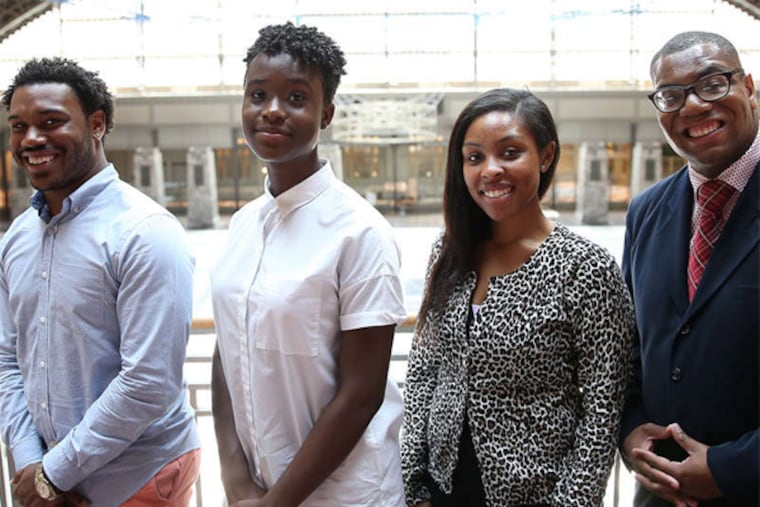The Faces of the NAACP's Future
Forget jaded millennials. These young members of the august civil-rights group have energy and idealism to spare.

DeVAUN BROWN entered Temple University in 2010, and he wanted to join a campus organization that was more than a social club.
"I wanted to be involved in something meaningful that would have a lasting impact," says Brown, 24, who works in the Philadelphia School District's office of family and community engagement.
So he joined Temple's student chapter of the NAACP. He'd always known about the group but wasn't acquainted with its century-long commitment to civil rights - not just for blacks, but for all Americans, he says. He was impressed by the sense of social responsibility he felt among NAACP members.
He's now vice president of the NAACP Pennsylvania State Conference Youth and College Division, helping college chapters work on causes like voting rights and access to quality education.
"The NAACP has helped me to grow and to care about what's moral and ethical in our society," Brown says. "It's also made me appreciate the freedoms I have because of the hard work of those who came before me. They make me want to ensure that those who come after me will have those same freedoms, if not more."
What a lovely guy.
There's a myth these days that millennials are too jaded to vote, too self-centered to empathize with anyone other than their peers, too soft to survive in the real world and more enamored by the info in their smartphones than by the hard-won wisdom in their elders.
I found no evidence of the myth among the local young members of the NAACP I interviewed last week as the city prepped for the organization's 106th annual convention. They were excited, dynamic and adamant that they needed to make the world a better place if it is to be a fair and just one for the families they hoped to raise in the future.
And that wouldn't be possible unless all voices were heard, including theirs, in chorus.
Lauren Footman wanted to amplify those voices when she was a sophomore at Bryn Mawr College. There were many important questions being asked on campus, she says, but they were being asked in silos:
How to attract and retain students and faculty of color? How to increase awareness of HIV-AIDS among young African-American women? How to make higher education accessible to all?
The best organization to explore those questions, she thought, was the NAACP. So she founded a chapter at Bryn Mawr. It sponsored workshops, met with college administrators, held conferences - all well-received.
"People were aware of NAACP being a change agent and it made them willing to participate," says Footman, who works in training at PricewaterhouseCoopers and is president of the NAACP's Pennsylvania State Youth and College Division.
"When you have this 103-year-old institution [at the time] behind you, people are drawn to you. Our discussions were collaborative, we built relationships with administrators. It was very rewarding."
The chapter's current president, rising junior Danielle Roomes, says the chapter helped calm tensions last year after two students hung a Confederate flag outside their dorm, oblivious to the uproar it would cause.
Says Roomes: "The reaction was strong. Our chapter led discussions, which led to a community day of learning where everyone discussed their views and how they came to them. It was such a success, the school is going to make it an annual event."
The Pennsylvania NAACP has a strong Youth and College Division, with about 40 chapters, but I don't know if every state's membership is as robust. The NAACP did not respond to multiple requests to talk about what their young members provide the organization.
For perspective, I instead chatted with the Rev. Mark Tyler, pastor of Philadelphia's historic Mother Bethel AME Church, going strong since 1760. If anyone knows the challenges and necessity of keeping an old institution vital to newcomers, it's Tyler.
"Any organization that does not create a welcoming atmosphere for young people is asking to go into extinction," Tyler says. "They bring energy and enthusiasm and take hold of these ancient values and history and make them relevant for today. When our church, and the NAACP, does this well is when it doesn't hold holds its traditions as sacred cows that can never be tampered with. But there has to be give and take. The older members have wisdom to share. We learn from each other."
Shawn Aleong, a Temple freshman, has been floored by what he has learned about civil rights since he joined the NAACP. As a young, African-American man with a disability - he has cerebral palsy - he knows firsthand the need to advocate for those on the margins.
"Anyone of us can be the next Malcolm X or Rosa Parks or Martin Luther King," says Aleong, the juvenile justice chair of the NAACP Pennsylvania State Conference Youth and College Division. "This is a marvelous organization for young people. Joining was the best decision I ever made."
Phone: 215-854-2217
On Twitter: @RonniePhilly
Blog: ph.ly/RonnieBlog
Columns: ph.ly/Ronnie